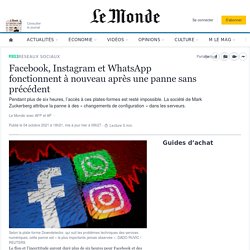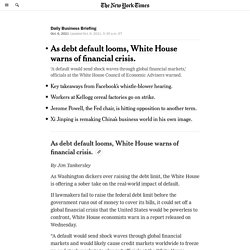

Introduction. Facebook, Instagram et WhatsApp fonctionnent à nouveau après une panne sans précédent. Le flou et l’incertitude auront duré plus de six heures pour Facebook et des millions de personnes à travers le monde.

Le réseau social ainsi qu’Instagram – son application de partage de photos –, WhatsApp et Messenger – ses applications de messagerie – sont revenus en ligne dans la nuit de lundi 4 à mardi 5 octobre, après une panne d’une longueur sans précédent pour le groupe californien, déjà très décrié. Vers 0 h 30, heure de Paris, l’entreprise a prévenu, sur son compte Twitter, de la remise en ligne de ses applications et services, alors que l’incident avait commencé peu avant 18 heures, lundi. To the huge community of people and businesses around the world who depend on us: we're sorry. We’ve been working h… Facebook (@Facebook) Puis un communiqué de la société de Mark Zuckerberg a attribué ce blocage majeur de ses réseaux et messageries à un « changement de configuration défectueux » de ses serveurs. Explications des articles. Explication article siècle digital. Le transfert de données entre UE et États-Unis, grand absent du Trade and Technology Council ?
À l’occasion du Trade and Technology Council organisé le 29 septembre à Pittsburgh, entre l’Union européenne (UE) et les États-Unis, une question était sur toutes les lèvres : où en sont les négociations du futur accord de transfert de données entre les deux rives de l’Atlantique ?

Une thématique présente seulement en filigrane lors de ce rendez-vous diplomatique pour la coordination entre Washington et Bruxelles sur les nouvelles technologies. Un accord entre les États-Unis et l’UE, une urgence D’après le Wall Street Journal des autorités américaines avait émis la possibilité de mettre le nouvel accord au sein des discussions générales au début du mois de septembre. As the debt default looms, the White House warns of financial crisis. As Washington dickers over raising the debt limit, the White House is offering a sober take on the real-world impact of default.

If lawmakers fail to raise the federal debt limit before the government runs out of money to cover its bills, it could set off a global financial crisis that the United States would be powerless to confront, White House economists warn in a report released on Wednesday. “A default would send shock waves through global financial markets and would likely cause credit markets worldwide to freeze up and stock markets to plunge,” officials at the White House Council of Economic Advisers warned.
“Employers around the world would likely have to begin laying off workers.” The potential for an ensuing global recession, they wrote, could be worse than the 2008 financial crisis, because it would come as countries continue to struggle to escape the Covid-19 pandemic. “The federal government could only stand back,” they wrote, “helpless to address the economic maelstrom.”
The new York times. India's got SaaS, the next big thing in tech, and it could be worth $1 trillion. Now, Asia's third largest economy is ready for the next big frontier in tech: Coming up with a new generation of software companies like Zoom or Slack.

The Covid-19 pandemic has forced business around the world to make huge investments in digital infrastructure, furthering the influence of companies providing software-as-a-service, or SaaS. Businesses spent an extra $15 billion per week last year on tech as they scrambled to create safe remote working environments, according to a KPMG survey. India's software-as-a-service industry could be worth $1 trillion in value by 2030 and create nearly half a million new jobs, according to a recent report compiled by consulting firm McKinsey & Co. and SaaSBoomi, a community of industry leaders.
There are nearly a thousand such companies in India, of which 10 are unicorns, or startups worth at least $1 billion, the report said. Cnn.